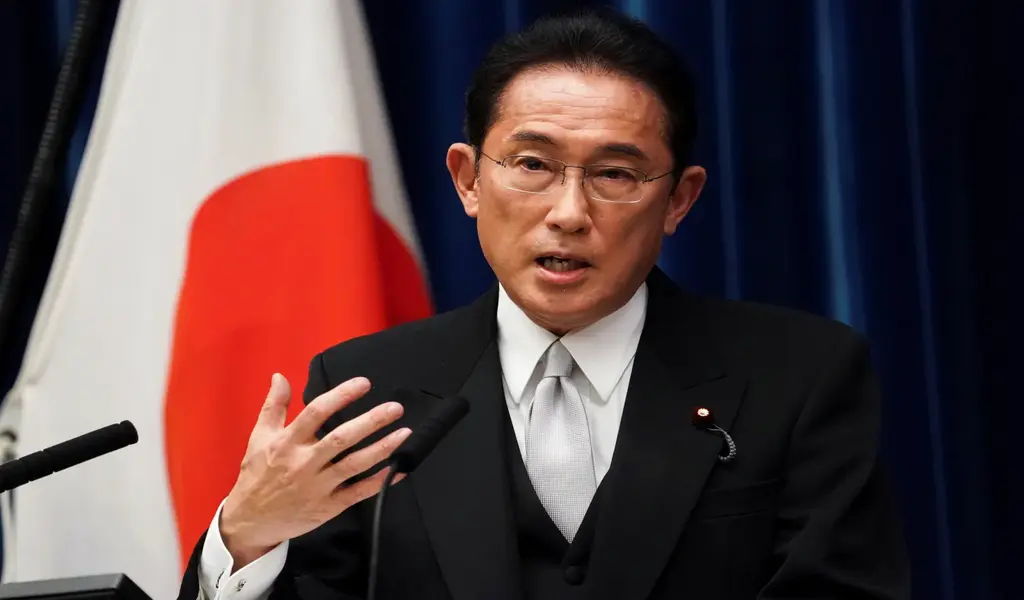(CTN NEWS) – Japanese Prime Minister Fumio Kishida conducted a brief visit to the tsunami-ravaged Fukushima nuclear facility on Sunday.
The purpose of his visit was to emphasize the safety measures in place for the upcoming release of treated radioactive wastewater into the Pacific Ocean.
This contentious initiative, pushed by his administration, is slated to commence soon, despite facing opposition both domestically and internationally.
Kishida’s Diplomatic Activities: From Camp David Summit to Controversial Water Release
Kishida’s visit followed shortly after his return on Saturday from a summit involving leaders from the United States and South Korea. The summit took place at the American presidential retreat, Camp David.
Prior to departing Washington on Friday, Kishida emphasized the need to arrive at a decision regarding the release date for the treated water. This decision has been stalled due to the controversies enveloping the proposed plan.
Since the government unveiled the release proposal two years ago, it has encountered robust resistance from Japanese fishing associations.
These groups are concerned about potential further harm to the reputation of their seafood industry, which is still striving to recover from the aftermath of the nuclear incident.
Moreover, entities in South Korea and China have also raised apprehensions, thus elevating the issue into a political and diplomatic matter.
Both the government and Tokyo Electric Power Co., the plant’s operator, contend that the water’s removal is essential to facilitate the decommissioning of the facility and to avert accidental leaks from the tanks.
This necessity arises from the fact that a significant portion of the water remains contaminated and requires additional treatment.
Japan Gains IAEA Support for Enhanced Transparency in TEPCO’s Plan as Government Advocates Safety
Japan has garnered support from the International Atomic Energy Agency (IAEA) to enhance transparency and credibility in relation to the plan put forth by TEPCO (Tokyo Electric Power Co.), while also ensuring alignment with international safety standards.
Concurrently, the government has intensified efforts to advocate for the plan’s safety within the country and through diplomatic channels.
Following a comprehensive evaluation, the IAEA released a final report in July affirming that the TEPCO plan, if meticulously executed as designed, will yield minimal consequences for both the environment and human well-being.
This validation encouraged Japan to proceed with its proposed actions.
After his visit to the nuclear plant on Sunday, Prime Minister Kishida informed reporters that he intends to engage with the head of the national fisheries organization on Monday.
Subsequently, his ministers will convene next week to determine the specific date for the plan’s implementation. Although Kishida refrained from disclosing the precise starting date for the water release, it is widely anticipated to occur towards the end of August.
During his Sunday tour, Kishida observed the wastewater filtering and dilution facilities and engaged in discussions with TEPCO’s President Tomoaki Kobayakawa and other senior officials.
He urged these leaders to place paramount importance on safety during the release process and to aid in preventing any harm to the reputation of local fisheries.
In tandem with efforts to secure understanding from the fishing community, the Japanese government has also endeavored to elucidate the plan’s details to South Korea.
This outreach aims to prevent the issue from impinging upon the progress of their burgeoning relationship. Japan, South Korea, and the United States are striving to fortify their trilateral ties amidst escalating concerns posed by China and North Korea.
The Fallout of Fukushima: Challenges and Progress in Managing Contaminated Water
Although South Korean President Yoon Suk Yeol’s administration recently voiced support for the Japanese plan, he has encountered criticism domestically.
During a joint press conference held at Camp David, President Yoon expressed endorsement for the IAEA’s safety assessment of the plan, while simultaneously underscoring the necessity for a transparent inspection process by the international community.
Kishida indicated on Friday that the outreach initiatives have made headway and affirmed that the ultimate decision will incorporate safety preparations and strategies to mitigate any potential damage to the fisheries’ reputation.
The Fukushima Daiichi plant endured extensive damage on March 11, 2011, due to a massive earthquake and subsequent tsunami.
These events led to the destruction of the plant’s cooling systems, resulting in the meltdown of three reactors and the contamination of their cooling water. This water is currently stored in approximately 1,000 tanks, with capacity expected to be reached by early 2024.
The treatment process employs an Advanced Liquid Processing System, capable of reducing the levels of over 60 specific radionuclides to levels approved by the government for release.
However, tritium remains in the treated water, with both the government and TEPCO asserting its safety for human consumption in limited quantities.
While the broader scientific consensus suggests that the environmental impact of the treated wastewater would be minimal, some voices advocate for increased attention to the residual low-dose radionuclides that persist in the water.
RELATED CTN NEWS:
Monitoring An Emerging Covid-19 Variant: BA.2.86’s Mutations, Uncertainties, And Global Implications
Vivek Ramaswamy’s 10 Truths: A Closer Look At His 2024 GOP Presidential Campaign
Guilty Verdict: British Nurse Lucy Letby Convicted Of Infants’ Murders And Attempted Murders








